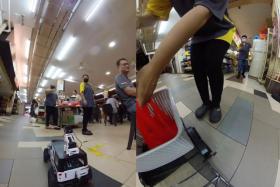Putting a car in space changes everything
Private companies strapping in for ride to the next frontier, signalling a possible shift from government dominance
The successful launch of entrepreneur Elon Musk's SpaceX Falcon Heavy on Tuesday marks a major turning point in humanity's approach to space exploration.
For the first time since the United States and Soviet Union began their race into orbit, the world's most powerful rocket was designed and built by a private corporation.
Up until recently, such rockets were very much a government business.
The Saturn Five rockets that took Neil Armstrong and his colleagues to the moon were produced by one of the largest and most expensive government projects of all time.
Private companies have long seen potential business opportunities in space. Commercial launches began in the 1980s with French firm Arianespace, but until a decade ago corporations, particularly in the United States, were more likely to use US or Russian government rockets to get their payloads into space than the other way around.
The implications of the change are enormous. Indeed, it now seems likely that if and when humans do eventually reach Mars, it may well be under the flag of private enterprise.
That's a goal electric car tycoon turned space entrepreneur Musk in particular is entirely open about. Tuesday's Falcon Heavy launch carried with it his own cherry-red Tesla electric roadster, flung towards the red planet to the strains of David Bowie's "Life on Mars."
While private companies once primarily relied on existing government technology, they are now striking out on their own.
A failure for the Falcon Heavy would have been a major setback for SpaceX, but would still have opened opportunities for rivals. Amazon founder Jeff Bezos has his own private spaceflight company, Blue Origin, with its prototype reusable New Glenn rocket - another major innovation.
Governments, of course, remain major players in space. Indeed, the United States, Russia and China retain a monopoly when it comes to putting people in orbit.
US President Donald Trump last year declared his intent to have Nasa put Americans back on the moon, while Mr Barack Obama talked the previous year of getting humans to Mars by the 2030s.
Mr Obama made it clear he saw private sector involvement as an essential part of such a project. The truth, though, is that it may be firms - and Mr Musk in particular - that are now really driving the agenda.
The entrepreneur has made it clear he may seek US federal and other earthbound government funding as part of that mission, but it increasingly looks as though the taxpayer might be a supporting element rather than - as would previously have been expected - in the driving seat.
In spite of the risk, there is growing enthusiasm for the industry. In 2016, US investors ploughed US$2.8 billion (S$3.7b) into space-related start-ups, US$400 million more than the previous year.
While that is only a fraction of the US$19.5 billion government allocation to Nasa - which receives just under 0.5 per cent of the overall US government budget - the SpaceX launch is a potent symbol of the private sector's appetite for space.
If the costs can be controlled, it's easy to imagine firms going further in the decades to come, perhaps mining asteroids or being allocated rights to explore different planets in return for taking a much greater share of the financial risk. - REUTERS
The writer is Reuters global affairs columnist.
Get The New Paper on your phone with the free TNP app. Download from the Apple App Store or Google Play Store now


